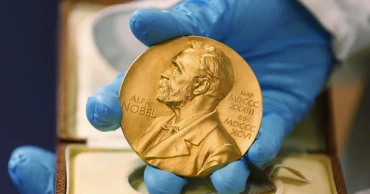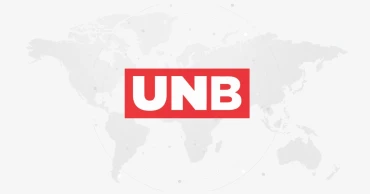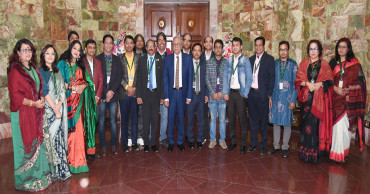Writers
5 things to know about the Nobel prizes
The beginning of October means Nobel Prize season. Six days, six prizes, new faces from around the globe added to the world’s most elite roster of scientists, writers, economists and human rights leaders.
This year’s Nobel season kicks off Monday with the medicine award, followed by daily announcements: physics on Tuesday, chemistry on Wednesday and literature on Thursday. The 2022 Nobel Peace Prize will be announced on Friday and the economics award on Oct. 10.
Here are five other things to know about the coveted prizes:
WHO CREATED THE NOBEL PRIZES?
The prizes in medicine, physics, chemistry, literature and peace were established by the will of Alfred Nobel, a wealthy Swedish industrialist and the inventor of dynamite. The first awards were handed out in 1901, five years after Nobel’s death.
Each prize is worth 10 million kronor (nearly $900,000) and will be handed out with a diploma and gold medal on Dec. 10 -- the date of Nobel’s death in 1896.
The economics award — officially known as the Bank of Sweden Prize in Economic Sciences in Memory of Alfred Nobel — wasn’t created by Nobel, but by Sweden’s central bank in 1968.
Between 1901 and 2021, the Nobel Prizes and the prize in economic sciences have been awarded 609 times.
WHO KNOWS WHO WILL WIN AND WHY?
The Nobel statutes prohibit the judges from discussing their deliberations for 50 years. So it’s probably going to be a while before we know for sure how judges made their picks for 2022 and who was on their short lists.
The judges try hard to avoid dropping hints about the winners before the announcements, but sometimes word gets out. Bookies in Europe sometimes offer odds on possible peace prize and literature Nobel winners.
WHO CAN NOMINATE A CANDIDATE?
Thousands of people around the world are eligible to submit nominations for the Nobel Prizes.
They include university professors, lawmakers, previous Nobel laureates and the committee members themselves.
Although the nominations are kept secret for 50 years, those who submit them sometimes announce their suggestions publicly, particularly for the Nobel Peace Prize.
WHAT ABOUT THE NORWEGIAN CONNECTION?
The Nobel Peace Prize is presented in Norway while the other awards are handed out in Sweden. That’s how Alfred Nobel wanted it.
His exact reasons are unclear but during his lifetime Sweden and Norway were joined in a union, which was dissolved in 1905. Sometimes relations have been tense between the Nobel Foundation in Stockholm, which manages the prize money, and the fiercely independent peace prize committee in Oslo.
WHAT DOES IT TAKE TO WIN A NOBEL?
Patience, for one.
Scientists often have to wait decades to have their work recognized by the Nobel judges, who want to make sure that any breakthrough withstands the test of time.
That’s a departure from Nobel’s will, which states that the awards should endow “those who, during the preceding year, shall have conferred the greatest benefit to mankind.” The peace prize committee is the only one that regularly rewards achievements made in the previous year.
According to Nobel’s wishes, that prize should go to “the person who shall have done the most or the best work for fraternity between nations, for the abolition or reduction of standing armies and for the holding and promotion of peace congresses.”
3 years ago
Poets, artists, journos unite against communal violence in Bangladesh
Over 200 poets, writers, artists and journalists on Tuesday staged a protest in the capital against the recent communal violence in Bangladesh.
The protesters gathered outside Bangladesh National Museum in Shahbagh in the afternoon and demanded that the perpetrators of the communal attacks in various parts of the country, including Rangpur and Cumilla, be brought to justice.
Their eight-point demands also included taking prompt steps to prevent communal and sexist remarks on social media.
The protest was anchored by recitation artist Shahadat Hossain Nipu. Also present were writer Anisul Haque, filmmaker Amitabh Reza, poet Chanchal Ashraf, journalist Ahmad Mostafa Kamal, writer Jharna Rahman, filmmaker Masud Pathik, actor Moutushi Biswas, poet Tokon Tagore, and author-journalist Humayun Kabir Dhali.
Speakers at the protest site claimed that the recent communal violence was nothing but a conspiracy, based on the rumours that the Holy Quran had been disrespected at a puja mandap in Cumilla.
"It has become clear to us that similar occurrences are occurring as a result of the government's impunity culture. We've seen in the past how the Hindu and Buddhist communities have been targeted and attacked purposefully based on false rumours spread on social media, none of which has been thoroughly examined and the culprits have not been brought to punishment," the speakers said.
"Bangladesh is a country of communal harmony. In 1971, Hindus, Muslims, Buddhists and Christians of all faiths fought side by side and made Bangladesh independent; but in the last 50 years after independence, every government has abandoned the spirit of the Liberation War to go to power by colluding with communal forces or to go to shameless competition for power. Article 32 of the constitution has given way to the formation of religion-based political parties," they alleged.
Renowned writer Swakrito Noman raised eight-point demands at the event, on behalf of the organisers.
The demands include identifying the communal attackers in different parts of the country centring on this year's Durga Puja and arresting and prosecuting them immediately; identifying the real reasons behind the communal attacks in Ramu, Nasirnagar, Shalla, Cumilla, Hajiganj, Noakhali and Rangpur; taking steps to stop communal and misogynistic statements on social media including Facebook, YouTube and Waz Mahfil; and the abolition of 'state religion' from the Constitution.
4 years ago
Bloomberg writer pours his heart out while praising Bangladesh’s progress
Bangladesh is destined to be South Asia’s standout success and countries like India and Pakistan have much to learn from Bangladesh, says a Bloomberg article.
"Today, the country’s 160 million-plus people, packed into a fertile delta that’s more densely populated than the Vatican City, seem destined to be South Asia’s standout success," writes Mihir Swarup Sharma, a Bloomberg Opinion columnist.
Sharma, also a senior fellow at the Observer Research Foundation in New Delhi and head of its Economy and Growth Programme, mentioned that the past 50 years have shown how unwise it is to bet against Bangladesh.
"In 1971, success seemed well beyond a long shot," reads the article titled "South Asia Should Pay Attention to Its Standout Star."
Read:BUILD Chairperson meets new FBCCI president
Once again, Bangladesh should benchmark itself against Vietnam, which is not only part of the China-centric Regional Comprehensive Economic Partnership and the successor to the Trans-Pacific Partnership, but also signed an FTA with the European Union in 2019, reads the article.
"Transforming the terms of Bangladesh’s trade won’t be easy, which is why the effort needs to start now. Dhaka will have to beef up its negotiating capacity in particular: It doesn’t even have a dedicated set of trade negotiators in its commerce ministry."
Half a century ago, in March 1971, Bangladesh’s founders declared their independence from richer and more powerful Pakistan, the article reads.
The country was born amid famine and war; millions fled to India or were killed by Pakistani soldiers.
To the Pakistani military’s American backers, the new country seemed destined to fail: Henry Kissinger, then Secretary of State, famously called it a “basketcase.” George Harrison and Ravi Shankar organized the first-ever super-benefit to raise money for UNICEF relief work in the struggling country.
This month, Bangladesh’s Cabinet Secretary told reporters that GDP per capita had grown by 9% over the past year, rising to $2,227.
Pakistan’s per capita income, meanwhile, is $1,543. In 1971, Pakistan was 70% richer than Bangladesh; today, Bangladesh is 45% richer than Pakistan.
One Pakistani economist glumly pointed out that “it is in the realm of possibility that we could be seeking aid from Bangladesh in 2030.”
Read:COP26 President-Designate Sharma due Wednesday to discuss climate issues
India — eternally confident about being the only South Asian economy that matters — now must grapple with the fact that it, too, is poorer than Bangladesh in per capita terms. India’s per capita income in 2020-21 was a mere $1,947.
In reality, the article reads, Bangladesh is far richer than the depressed Indian states where Hindu nationalist politicians have been railing against Bangladeshi “termites.” It’s as if Mississippi were fretting about illegal immigration from Canada.
Bangladesh’s growth rests on three pillars: exports, social progress and fiscal prudence. Between 2011 and 2019, Bangladesh’s exports grew at 8.6% every year, compared to the world average of 0.4%.
The success is largely due to the country’s relentless focus on products, such as apparel, in which it possesses a comparative advantage.
Meanwhile, the share of Bangladeshi women in the labor force has consistently grown, unlike in India and Pakistan, where it has decreased.
And Bangladesh has maintained a public debt-to-GDP ratio between 30% and 40%. India and Pakistan will both emerge from the pandemic with public debt close to 90% of GDP. Fiscal restraint has allowed Bangladesh’s private sector to borrow and invest.
Bangladesh’s success brings its own set of problems, reads the article.
For one, its exports benefit from the country’s participation in various mechanisms that allow tariff-free access to developed economies, such as the U.S.’s Generalized System of Preferences.
Read:UNHCR seeks adequate medical assistance for Rohingyas affected in Bhasan Char
These groupings are only open to the world’s least developed countries. Thanks to its growth, Bangladesh will likely have to give up these privileges by 2026 or so.
As its economy matures, its comparative advantages will also change. Like Vietnam and others, it will then have to shift emphasis away from garments to higher-value exports. The transition will test Bangladesh as it has those other nations.
The government needs a strategy for the next decade that focuses on new forms of global integration and on a continued transformation of the economy, the article reads.
The smartest thing to do would be to retain access to the developed world’s markets by signing free-trade agreements. Work has started on an FTA with the Association of Southeast Asian Nations, according to Bangladeshi officials, but there’s a lot more to be done.
4 years ago
President for behavioural change to continue development
Noting that the country has made tremendous progress in many sectors, President Abdul Hamid on Wednesday said a positive behavioural change is needed for continuation of the development trend.
6 years ago

.jpg)




